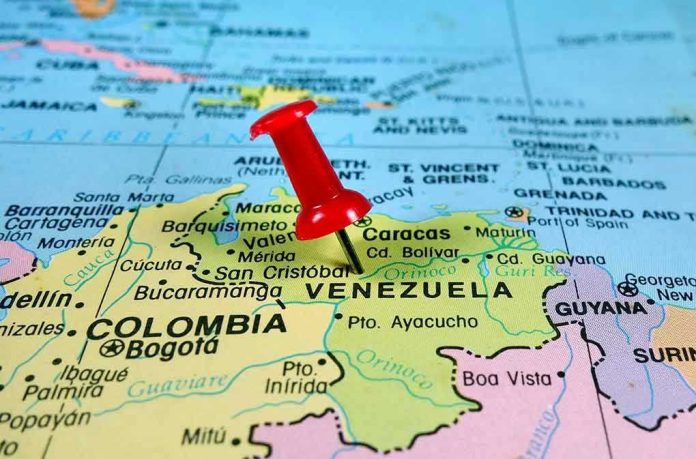
The Trump administration has placed a $50 million bounty on Venezuelan dictator Nicolás Maduro’s head as new State Department evidence reveals his regime’s unprecedented campaign of terror against freedom-loving citizens following the fraudulent 2024 election.
Story Highlights
- UN experts document Venezuela’s “harshest and most violent” repression campaign targeting over 2,200 arrested protesters
- Pro-government militias killed at least 22 demonstrators in coordinated attacks across 121 municipalities
- Maduro’s regime deployed door-to-door raids and digital surveillance tools to hunt down opposition leaders
- Trump administration’s $50 million bounty signals America’s renewed commitment to confronting socialist tyranny
Maduro’s Post-Election Reign of Terror Escalates
Venezuelan security forces and pro-government colectivos unleashed the most brutal crackdown in years following July 28, 2024’s disputed presidential election. UN-mandated experts documented systematic torture, arbitrary detentions, and killings targeting protesters who challenged Maduro’s fraudulent victory claim. The regime acknowledged arresting over 2,200 citizens between July 29 and August 6 alone, marking an unprecedented assault on democratic opposition.
Opposition candidate Edmundo González presented legitimate vote tallies from 84% of polling stations, clearly demonstrating his landslide victory over the socialist dictator. Maduro’s electoral authority refused to release detailed results while the captured judiciary rubber-stamped the regime’s fabricated claims. This transparent fraud sparked nationwide demonstrations across 121 municipalities, surpassing even the 2019 protests in scope and geographic reach.
Socialist Militias Target Innocent Civilians
Pro-government colectivos, acting as Maduro’s paramilitary enforcers, were implicated in approximately 19 of the 22 protester deaths documented in the first month following the election. These armed groups coordinate with state security forces to intimidate, assault, and murder Venezuelan citizens exercising their fundamental right to peaceful assembly. The regime’s hybrid repression model combines official violence with militia brutality to terrorize the population into submission.
Maduro’s government revived “Operation Tun Tun,” conducting door-to-door raids to hunt down opposition supporters, poll watchers, and protest participants. Authorities deployed the VenApp denunciation platform, encouraging citizens to identify and report neighbors who oppose the regime. These surveillance tactics mirror the oppressive methods used by history’s worst authoritarian regimes, demonstrating socialism’s inherent threat to individual liberty and constitutional rights.
International Response Exposes Biden-Era Weakness
While many governments refused to recognize Maduro’s fraudulent victory, the previous administration’s feckless foreign policy left America’s response fragmented and ineffective. An Organization of American States resolution demanding verifiable election results fell just one vote short, highlighting the diplomatic failures that allowed this crisis to escalate. Several nations recognized González as the legitimate president, but lacked coordinated pressure to force meaningful change.
Venezuela human rights hit new low as US puts $50M bounty on Maduro's head: State Department https://t.co/hHgJDHG2W9
— Fox News (@FoxNews) August 12, 2025
The Trump administration’s $50 million bounty represents a dramatic shift from the weak-kneed approach that emboldened dictators worldwide. This decisive action demonstrates America’s renewed commitment to confronting socialist tyranny and supporting freedom-loving peoples against authoritarian oppression. The regime’s targeting of at least 143 opposition party members, including 66 leaders, reveals the systematic nature of Maduro’s assault on democratic institutions and constitutional governance.
Sources:
ACLED analysis of protest/repression patterns, fatalities, and colectivos’ role
AS/COA tracker on international reactions, casualty and arrest estimates
Carnegie analysis on international leverage, recognition, and election dispute














